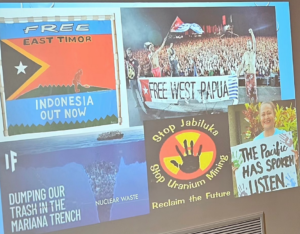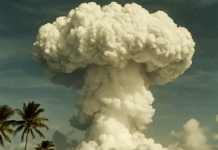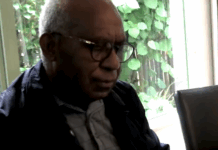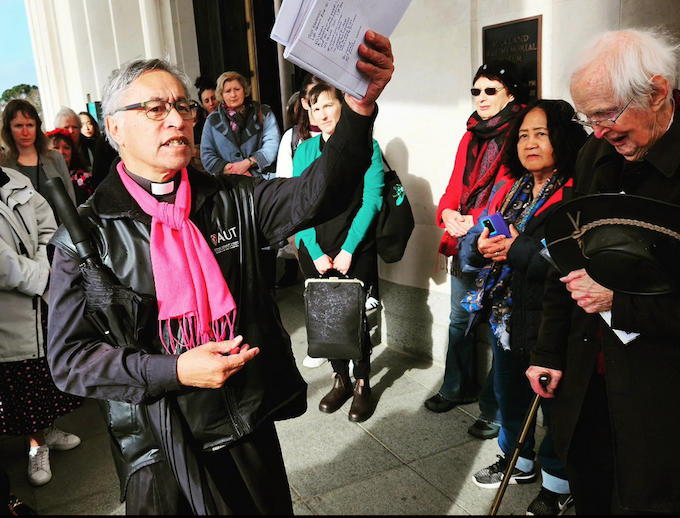
By David Robie, editor of Asia Pacific Report
Advocates and defenders of a nuclear-free Pacific have condemned the AUKUS military pact and warned New Zealand that the agreement would make the world “more dangerous” and should not join.
Participants at a Nuclear-Free and Independent Pacific (NFIP) movement teachers’ wānanga launched a petition against the pact with one of the “elders” among the activists, Hilda Halkyard-Harawira (Te Moana Nui a Kiwa), symbolically adding the first signature.
Speaking about the petition declaration in a ceremony on the steps of the Auckland Museum marking the 10 July 1985 bombing of the Greenpeace flagship Rainbow Warrior, Reverend Mua Strickson-Pua explained that the AUKUS agreement was a military pact between Australia-UK-US that was centred on Canberra’s acquisition of nuclear propelled submarines.
“The pact also includes sharing weapons and other military technologies,” Reverend Strickson-Pua said, reading from the declaration.
“The New Zealand government is considering joining part of this pact. This petition opposes AUKUS and calls for a foreign policy centred on an independent, demilitarised and nuclear-free Pacific.”
Reverend Strickson-Pua asked why this was important.
“AUKUS is an aggressive military pact. Security in New Zealand and the Pacific can only be ensured by centring sustainable development, Indigenous rights, and environmental protection.
‘Deepen geopolitical tensions’
“AUKUS makes the world more dangerous. New Zealand participation in AUKUS would deepen geopolitical tensions in the Pacific, and threaten Pacific nations’ long held policy of ‘friends to all and enemies to none’.
“AUKUS impedes climate action. Climate change remains the single greatest threat to the livelihoods, security and wellbeing of all peoples of the Pacific.
“The threat of climate change requires international diplomacy and cooperation, not militarism.
“AUKUS threatens our nuclear free legacy. Aotearoa New Zealand has a proud history of anti-nuclearism and solidarity with the Nuclear Free and Independent Pacific movement.”
Reverend Strickson-Pua also stressed that AUKUS was not based on public consultation.
“It accelerates climate injustice, violates our treaties and regional commitments, and erodes regional decolonisation efforts.”
The petition urges the New Zealand government to reject any role in the AUKUS military pact and condemns the use of nuclear weapons and non-peaceful nuclear technologies in the Pacific.
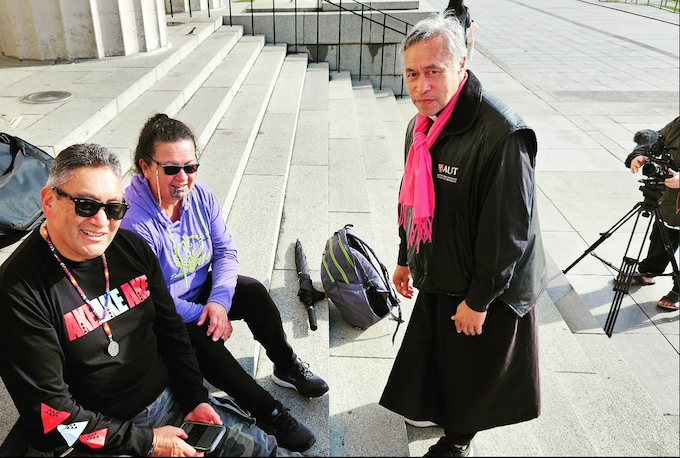
‘French Letter’
After the reading of the declaration, participants sang the popular Herbs anti-nuclear song “French Letter.”
This petition is led by Te Kuaka and is addressed to Prime Minister Chris Hipkins, Foreign Affairs Minister Nanaia Mahuta, Minister of Defence Andrew Little, and Associate Foreign Affairs Minister (Pacific) Carmel Sepuloni.
The petition launch and Rainbow Warrior reflection followed the teachers’ wānanga which featured many veteran activists of the NFIP and New Zealand nuclear-free movements such as Hilda Halkyard-Harawira, Hone Harawira, Reverend George Armstrong and others discussing past actions and strategies for the future — such as linking with the climate crisis.
“Today we heard from movement elders and educators about the ongoing relevance of the history of the NFIP movement for Aotearoa,” said Marco de Jong, a Pacific historian working for WERO (Working to End Racial Oppression) who is the wānanga co-convener.
“Our nuclear-free legacy is an important part of national identity, but it is important to make sure we approach it critically so we are not teaching mythology to our learners.
“Today we heard about regional and Māori dimensions that might add diverse historical perspectives, tomorrow we will work on translating them into resources for a range of different learning environments.”
